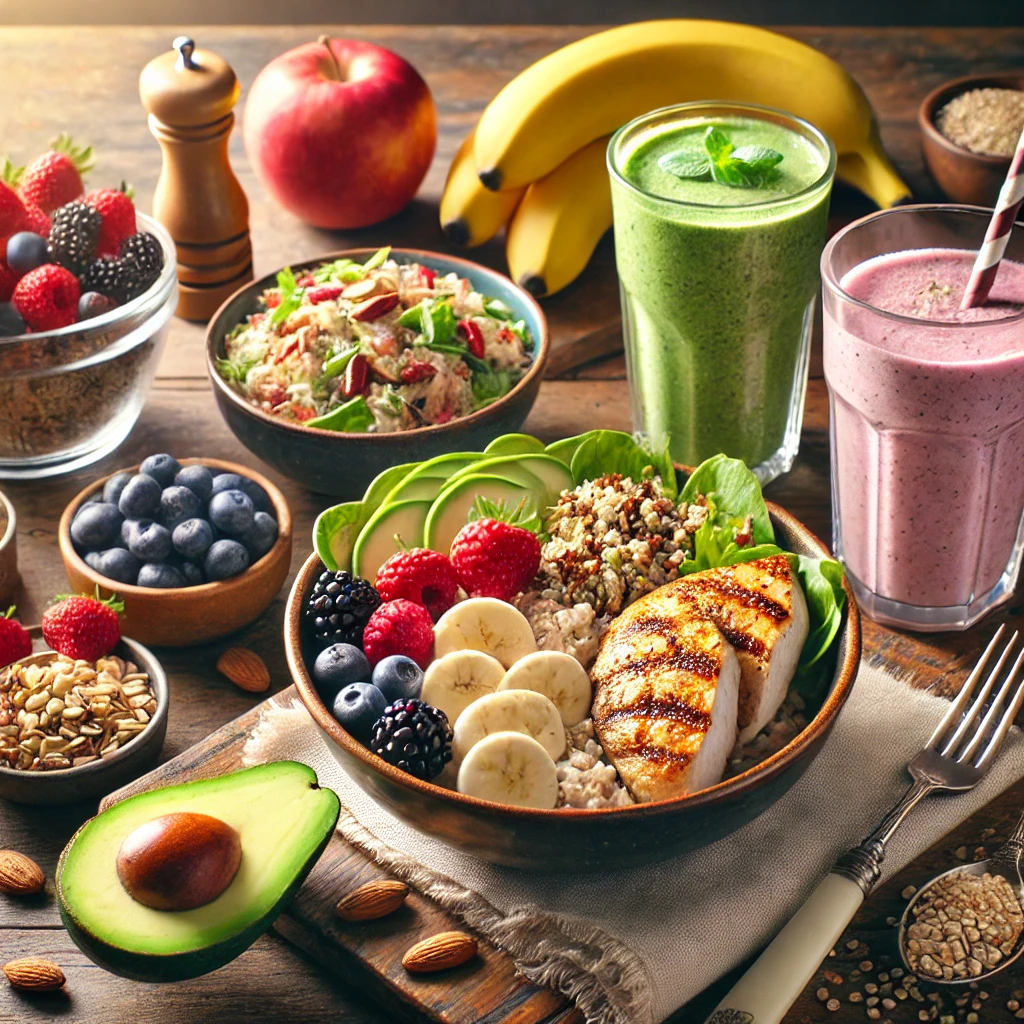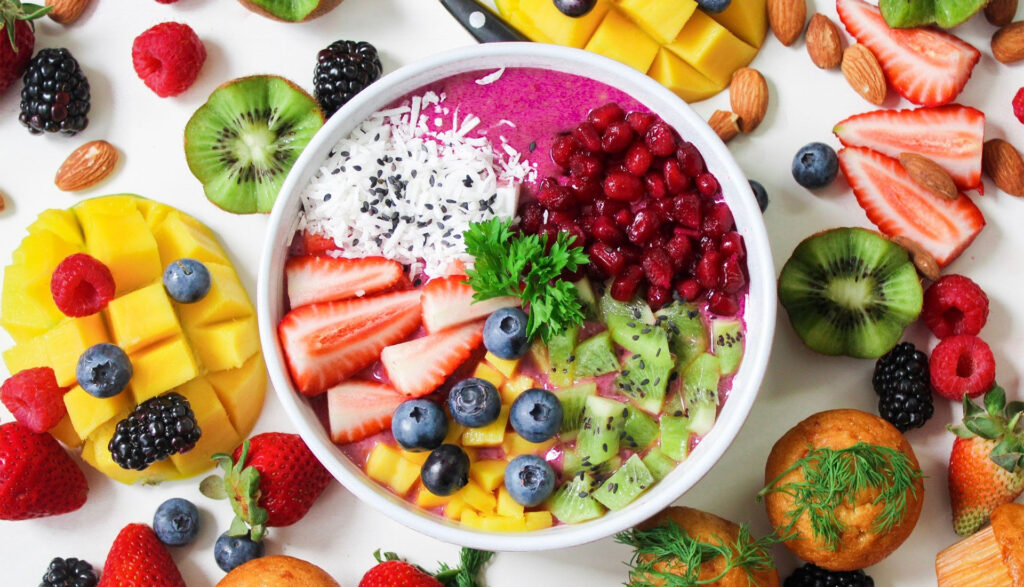
A balanced diet is crucial for runners, providing the necessary fuel to optimize performance, boost endurance, and speed up recovery. Unlike a standard diet, a runner’s balanced diet needs to meet the high physical demands of frequent activity, supplying energy, maintaining muscle strength, and supporting overall health. Here, we’ll dive into the specific components of a balanced diet for runners, explore the benefits of each nutrient, and provide practical tips and a sample meal plan to keep you running strong.
Why Runners Need a Balanced Diet
Running, especially long-distance or high-intensity running, places unique demands on the body. Proper nutrition supplies the energy required for physical exertion and aids in muscle repair, immune support, and bone strength. By focusing on a balanced diet, runners can prevent injuries, reduce muscle soreness, and sustain their energy across runs.
Key Nutritional Components for Runners
1. Carbohydrates: The Main Source of Energy
Carbohydrates are the body’s primary source of energy, particularly for endurance activities like running. During a run, the body taps into glycogen stores (carbs stored in muscles and liver) for quick energy. When glycogen stores are depleted, fatigue sets in, leading to the infamous “hitting the wall” experience many long-distance runners encounter.
Recommended Intake:
For runners, around 50-60% of total daily calories should come from carbohydrates to ensure sufficient glycogen stores.
Sources of Carbohydrates:
Whole grains (brown rice, oats, quinoa), starchy vegetables (sweet potatoes, squash), and fruits (bananas, apples, berries) provide high-quality carbs and essential fiber, which supports digestion and stabilizes blood sugar levels.
2. Protein: Essential for Muscle Repair and Growth
Running, especially at high intensity, can cause microscopic tears in muscle tissue. Protein aids in repairing and rebuilding muscle, helping runners recover faster and reducing the risk of injuries over time. Protein is also vital for maintaining lean body mass, which is beneficial for overall performance and endurance.
Recommended Intake:
Aim for about 15-20% of daily calories from protein, or around 1.2 to 1.4 grams per kilogram of body weight. This may increase slightly for runners doing intense strength training in addition to running.
Sources of Protein:
Lean meats (chicken, turkey), fish (salmon, tuna), dairy (Greek yogurt, cottage cheese), and plant-based sources (tofu, beans, lentils) are all excellent options. Including a variety of these protein sources ensures a range of essential amino acids for optimal recovery and muscle growth.
3. Healthy Fats: For Long-Lasting Energy and Joint Health
Healthy fats provide a slow, steady source of energy, helping runners maintain endurance during longer runs. Fats also play a role in reducing inflammation and supporting joint health, which is especially important for runners prone to repetitive strain injuries.
Recommended Intake:
Healthy fats should make up about 20-30% of a runner’s daily calories.
Sources of Healthy Fats:
Avocados, nuts (almonds, walnuts), seeds (chia seeds, flaxseeds), olive oil, and fatty fish (salmon, mackerel) are rich in healthy fats, anti-inflammatory compounds, and omega-3 fatty acids, which all support overall health and endurance.
4. Vitamins and Minerals: Supporting Health and Performance
Micronutrients, though needed in smaller amounts, are essential for maintaining a runner’s health and maximizing their performance. Here are some crucial vitamins and minerals for runners:
- Iron: Iron supports oxygen transport in the blood, which is vital for endurance. Iron deficiency can lead to fatigue, especially in runners. Sources: Spinach, lentils, red meat, and fortified cereals.
- Calcium and Vitamin D: These nutrients support bone health and prevent stress fractures, which can be common in runners. Sources: Dairy products, leafy greens, and fortified plant milk for calcium, and sunlight exposure and fatty fish for vitamin D.
- Magnesium and Potassium: These minerals aid in muscle function, reduce the risk of cramps, and maintain electrolyte balance. Sources: Bananas, sweet potatoes, leafy greens, and nuts.
5. Hydration: Essential for Performance and Recovery
Staying hydrated is one of the most critical aspects of a runner’s diet. Dehydration can significantly impair performance, lead to cramps, and even increase the risk of injury. Runners lose fluids through sweat, especially during long runs or hot weather, making it essential to replenish both water and electrolytes.
Hydration Tips:
- Drink water consistently throughout the day to maintain hydration levels.
- For longer runs, especially those lasting more than an hour, consider sports drinks or electrolyte tablets to replace sodium, potassium, and other lost electrolytes.
Sample Balanced Meal Plan for Runners
Here’s a sample meal plan to cover the nutritional needs of a runner while providing balanced meals to sustain energy, support muscle recovery, and enhance endurance.
| Meal | Foods |
|---|---|
| Breakfast | Oatmeal with berries, banana slices, and a spoonful of almond butter |
| Mid-Morning Snack | Greek yogurt topped with a handful of mixed nuts |
| Lunch | Quinoa salad with mixed greens, cherry tomatoes, grilled chicken breast, avocado, and a light olive oil dressing |
| Afternoon Snack | Apple slices with peanut butter or a homemade protein smoothie |
| Dinner | Grilled salmon, roasted sweet potatoes, and steamed broccoli |
| Post-Run Recovery Snack | Low-fat chocolate milk or a protein shake with a banana |
Tips for Maintaining a Balanced Diet as a Runner
Pre-Run Nutrition
A light, carbohydrate-based meal or snack 1-2 hours before a run can provide quick energy. Choose easily digestible carbs to avoid discomfort during the run.
- Example: A slice of toast with honey, a banana, or a small bowl of oatmeal.
Post-Run Recovery
After a run, the body benefits from a mix of protein and carbohydrates within 30 minutes. This combination helps repair muscles and replenishes glycogen stores.
- Example: A protein smoothie with fruit, low-fat chocolate milk, or Greek yogurt with granola.
Consistent Hydration
Sip water consistently throughout the day rather than chugging large amounts all at once. If running in hot or humid conditions, consider a hydration drink with added electrolytes.
Common Mistakes Runners Make with Diet
- Not Eating Enough Carbohydrates
Low-carb diets may be popular, but they can be counterproductive for runners. Carbohydrates are crucial for endurance, so runners should avoid cutting carbs too drastically. - Ignoring Protein Needs Post-Run
Skipping protein after a run can delay recovery, lead to muscle soreness, and reduce muscle repair. - Underestimating Hydration
Even mild dehydration can impair performance and recovery. Runners should pay close attention to their hydration needs, especially on long or intense runs. - Not Varying Nutrient Sources
Runners may stick to a limited range of foods, which can lead to nutrient gaps. Varying sources of carbs, proteins, and fats ensures a full spectrum of vitamins, minerals, and amino acids.
Conclusion
A balanced diet for runners goes beyond merely meeting calorie requirements; it provides the right nutrients to fuel each stage of training, from endurance to recovery. By focusing on carbohydrates for energy, protein for muscle repair, and healthy fats for sustained stamina, runners can enhance their performance, avoid injuries, and recover more effectively. Including vitamins, minerals, and consistent hydration rounds out a comprehensive nutrition plan that supports long-term health and fitness.
